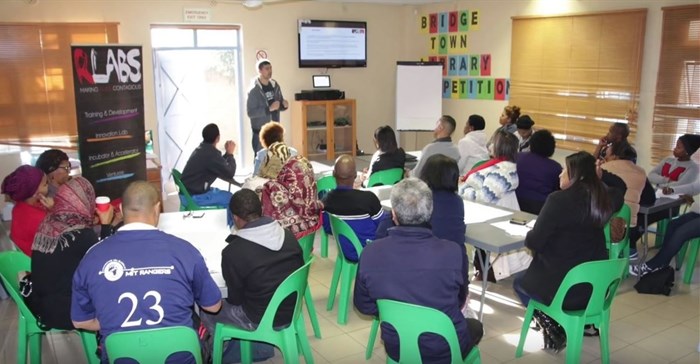UCT, RLabs offer free course on social innovation

The course, titled Becoming a changemaker: Introduction to social innovation, is presented online but, unlike most online programmes, it also has an in-person facilitated component now available in Strandfontein, Cape Town.
“Many of the challenges facing communities in South Africa actually represent opportunities, which can be turned into businesses and has the potential to create jobs for others,” says Marlon Parker, founder of RLabs and one of the instigators of the course.
Innovative, creative problem-solving
He says that the course has been designed to show individuals how they can make a difference, how they might, for instance, use social media to market an organisation or enterprise or how the resources at a library can be used to mobilise a youth group. “It is about showing people how problems can be solved innovatively and creatively,” he says.
The six-week course is the University of Cape Town’s sixth Massive Open Online Course (MOOC) that is being made freely available online through UCT’s Centre for Innovation in Learning and Teaching (CILT) and international online learning platform Coursera. But this course has one important difference. Despite the fact that most of the material is delivered online, students will also have access to a physical ‘campus’ where they can go for information and get help with assignments or – for those who don’t have easy access to wifi – to access all the content on the internet.
Overcoming barriers of access
Director of the Bertha Centre Dr François Bonnici says that this format of running the MOOC lessens the barrier of access to the internet and data costs as the content will be available offline to the participants and will be contextualised by the local facilitators.
“The Strandfontein venue is really a place where people can come to connect, to brainstorm ideas and do the course online,” says Parker. “There will be someone to help facilitate the course content offline, to explain concepts and provide further assistance.” He says more of these cafés/campuses are planned - which forms part of their RLabsU initiative - from Atlantis to Hanover Park, as well as other venues across the Cape Flats.
Parker adds that the course material is presented by UCT Graduate School of Business lecturers on social innovation and entrepreneurship, including Dr Bonnici and Dr Warren Nilsson. “And people will meet other participants from all over the world and build networks across the continent,” he says. “This is where the magic happens, online. It opens huge opportunities for collaboration.”
Advocating and supporting initiatives such as RLabs forms part of the Bertha Centre’s mandate. The centre is the first academic centre in Africa dedicated to advancing social innovation and entrepreneurship.
Opportunity to share knowledge
Commenting on UCT’s decision to launch MOOCs, deputy vice chancellor Professor Sandra Klopper explains that in developing the university’s MOOC strategy, there has been awareness of the scarcity of contributing universities from Africa in particular.
“We believe there is an opportunity to share knowledge generated from our leading academics and researchers, and to showcase the university’s rich array of intellectual and teaching resources.”
RLabs empowers youth through the use of innovative and disruptive technology by teaching them vital skills and providing much needed support and a sense of community. It is active in 23 countries. This is its latest collaboration with UCT.
Dr Bonniçi adds: “We are excited about pioneering a new kind of MOOC that will reach deeper into communities. It will also advance access to quality education in order to catalyse social change.”
“And, as RLabs, we are really excited to partner with the Bertha Centre who have been pioneering work and research in social innovation,” agrees Parker. “This collaboration also enables us to fulfil a broader mandate to see more changemakers driving social change globally.”
For more information on the course or to sign up, go to: www.coursera.org/learn/social-innovation.